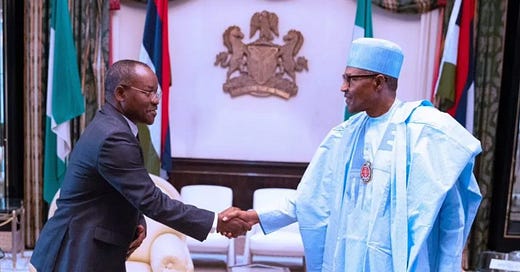Nigeria Promises to Consider Burundi’s Gasoline Request
RegionWeek Newsletter Vol VII, Issue #224 | Thursday, January 5, 2023
Nigerian President Muhammadu Buhari has reportedly promised that he will ask the Nigerian National Petroleum Company Limited to consider the Burundian government’s request for energy, especially in the form of petrol. He reportedly made the promise on Tuesday, January 3, 2023, when he received Burundi’s Minister of Finance, Budget, and Economic Planning, Audace Niyonzima, in Abuja.
The Nigerian president promised to support Burundi in various ways as needed, in the spirit of African solidarity and brotherhood. The Nigerian newspaper, Newspread, reports.
After the request for assistance in the field of energy supply, by Audace Niyonzima, the Nigerian president said he knows the pain of a shortage of energy for a country, according to the same source.
Delivering his country’s message to the President, a statement from Newsspreed Nigeria, the Special Envoy of President Evariste Ndayishimiye wished the country well in general elections scheduled for February and March, this year.
Join RegionWeek Telegram channel! Never miss important updates!
“We pray that the polls would be peaceful and successful so that Nigeria would maintain her reputation as a bastion of peace and stability,” Niyonzima said.
Why it matters
Burundi has no oil or gas resources, so all petroleum products are imported from Saudi Arabia via Tanzania. As imported petroleum products are supplied via the neighboring countries, their supply is costly and often irregular.
Burundi petroleum products supply
In 2019, the top partner countries and regions from which Burundi Imports Fuels include Saudi Arabia, United Arab Emirates, Rwanda, Tanzania and Kenya. Burundi Imports from Saudi Arabia of Mineral fuels, oils products was US$130.07 Million during 2021, according to the United Nations COMTRADE database on international trade.
There are two main oil refineries in East Africa – Great Lakes region, one in Kenya and in Tanzania. Kenya Petroleum Refineries Limited (KPRL) currently has a daily crude processing capacity of 2,000 barrels per day. TIPER Dar-es-Salaam oil refinery can process 17,500 barrels per day.
Fuel is transported by road from Tanzania and Kenya by fuel tankers. Oil products in the region are distributed using two main routes that include the Northern and Southern corridors. The Northern corridor serves Kenya, Uganda, Rwanda, Burundi, Eastern DRC and Southern Sudan through the Mombasa port.
The Southern Corridor serves Tanzania, Uganda, Rwanda, Burundi and Eastern DRC through the Dar es Salaam port. Fuel distribution by road is well organized but fuel shortages occur due to the fuel pipeline having insufficient capacity to meet demand.
Fuel Crisis in Burundi
Burundi experiences fuel crisis most often due to supply disruptions caused mainly by the fragility of its convalescent economy. Activist Faustin Ndikumana, president of PARCEM, says that the fuel shortage observed in recent times is linked to global geopolitics.He notes that for importing countries that do not have enough means like Burundi, it is a real problem without forgetting that we have a crisis of lack of currency in our country.
The Burundian economy is going through a period of unprecedented turbulence in terms of internal mobility. The fuel shortage has become recurrent for more than 5 months. The upward revision of transport prices has only complicated matters.
According to commentators, the fuel crisis has roots in a de facto monopoly. They note that the money allocated to the main importer is used for other things than importing fuel.
According to figures provided by sources to a local media, in 2022, the six fuel importing companies got 16,500,000 USD from the State. Interpetrol takes the lead with US$10 million. Delta ranks second with $1.5 million. BUPP, YOC, each received 1.5 million. PRESTIGE, a new player in the field, got $2 million.
During his meeting with the population of the province of Ngozi at the end of July 2022, the President of the Republic of Burundi Evariste Ndayishimiye recognized that the issue related to the shortage of fuel is relevant. However, he promises that his government is working to find an adequate response.
Thanks for reading,
Fabrice Iranzi, Editor in Chief, RegionWeek
More from our Website
Burundi: The Ministry of Education plans to include IPA and ENS in the list of schools that teach Braille. On January 4 the world celebrates the day dedicated to braille writing (writing for the blind), the Director of Inclusive Education in the Ministry of Education and Scientific Research, Patrice Tuhabonyimana informs that the government intends that the Institut Pédagogique Appliqué (IPA) and the Ecole Normale Supérieure (ENS) be included in the list of schools that teach the subject of Braille so that teachers may know how to use Braille.
Tanzania: President Samia Suluhu Lifts Six-Year Ban on Political Rallies.Tanzanian President Samia Suluhu Hassan lifted a six-and-a-half years ban on political rallies on Tuesday, January 3rd, 2023, in Dar es Salaam, which the opposition has been demanding, seeking a level playing field ahead of civic elections next year and the 2025 general election.
Kenya: UNFPA Provided Motorcycle Ambulance to Help Pregnant Women in Access Life-Saving Maternal Healthcare in Turkana County. “The hardship brought on by the drought has left many women weak and malnourished, and I cannot imagine them giving birth without the support of a skilled health professional,” says Epeyon. “When my wife got pregnant the first time, she gave birth at home and our child developed health complications that have affected him into adulthood.”
Thanks to Christella Ntirenganya, Fleur Mariette Muhire for their contribution on this Newsletter




